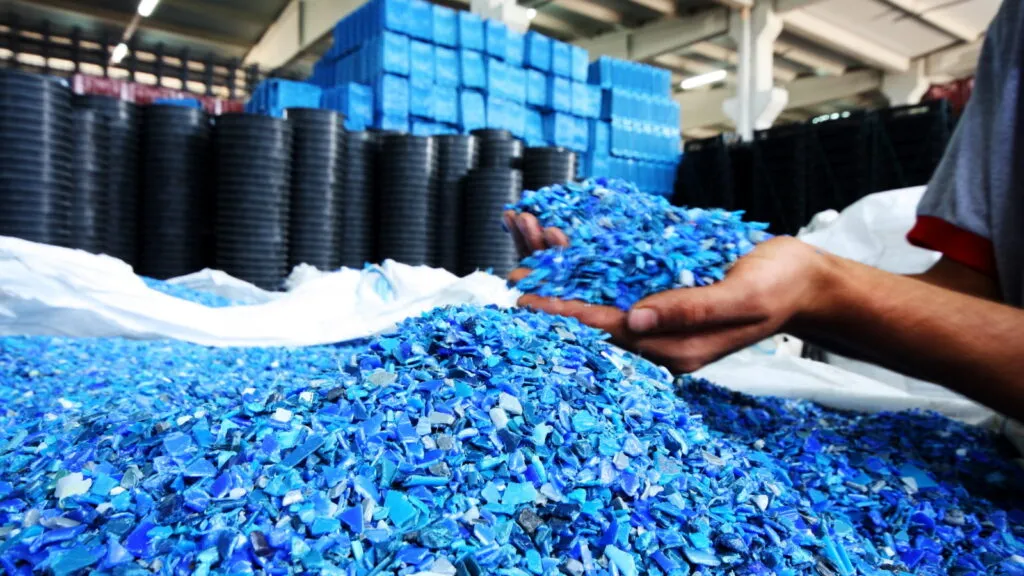

The use of plastic bags has become ubiquitous in our daily lives, with a growing demand for convenient packaging solutions. In response to this demand, many plastic companies are investing in the production of biodegradable plastic bags and high-quality recycled resin.
The market for recycled resin is expected to grow in the future as plastic bag factories look to meet consumer demand for sustainable and cost-effective packaging solutions.
The shift towards recycled resin and biodegradable plastic bags is an important trend in the plastic industry, offering a promising outlook for the future.
Challenges Facing the Plastic Industry
The plastic industry is facing a challenge in providing high-quality secondary feedstock in enough quantities to meet the increasing demand.
According to Plastics Europe, there was 390.7 million metric tons of global plastic production in 2021, with 90.2% being virgin-based and 8.3% being post-consumer recycled.
The majority of plastic production, 180.5 million metric tons, was polyolefins. Although the production of plastic is abundant, the recycling rate is low, and high-quality recyclates are scarce.
Finding solutions is crucial as regulations and recycled content targets become more stringent and time-sensitive.
Waste Management Infrastructure
Waste management infrastructure has improved in many countries, but recycling capacities are still not enough to meet the demand for recycled resin. Scaling solutions to produce the necessary quantity and quality requires more investment.
Sensor-based flake sorting technology solves some of these challenges by improving the recycling of polyolefins, polyethylene terephthalate, and other materials. It enables recyclers to gather more materials, increase yield, and remain profitable.
Improving Recyclate Quality through Flake Sorting
The quality of recyclates is significantly improved through flake sorting. The final purification stage before extrusion creates high-purity mono fractions of a single material type and/or color, which is essential for recycling and directly impacts recyclate quality and productivity.
Many bottle recycling factories use flake sorters, but they have much more potential. They can also handle mixed plastic waste, which opens up new sources of feedstock and enhances the quality of recyclates.
Without modern flake sorting techniques, the final product is often a mixture of polymers and pigments, which is low-quality and only suitable for low-demand, low-value applications.
However, the increasing demand for high-quality secondary feedstock, driven by strict recycled content standards and sustainability credentials, is motivating the use of advanced flake sorting.
Large quantities of top-quality raw materials are available. The availability of recyclable polymers can vary, and plastic recyclers must be adaptable to meet the changing demand and supply.
They must use more contaminated post-consumer waste to meet market demand if recyclable polymers are scarce, and they must meet high purity standards from increasingly polluted feedstock regardless of volume and type.
The Benefits of Flake Sorters
Flake sorters offer greater stability in feedstock compared to conventional processing equipment. They are compact, easy to install, and versatile, making them a good investment for small and large businesses.
Advanced flake sorting can handle fluctuating contamination levels without affecting recovery or purity.
The technology turns low-quality raw material into pure flakes that meet the highest quality standards, allowing recyclers to recover previously unrecoverable material and maximize fraction value.
Sorting Polyolefins
Sorting polyolefins creates new opportunities. As the industry moves towards using more recycled polyolefins in high-quality products, polyolefins are abundant and offer several possibilities.
Upgrading polyolefins is challenging because polyolefin bales contain two important components, polyethylene and polypropylene, unlike polyethylene terephthalate bales, which are entirely polyethylene terephthalate.
The mix of infeed materials in each bale can vary unpredictably. To make high-purity recycling fractions from polyethylene and polypropylene flakes, they must be precisely identified and separated.
Modern sensor-based flake sorters have transformed the industry. They can accurately separate polyolefins by polymer type and color, producing various fractions.
A recycling factory can shred and wash materials in one line before flake sorting with the latest technology. This eliminates the need for multiple lines and batch processing.
This technology enables recyclers to process large amounts of post-consumer materials to create high-purity recycled polyethylene (rPE) and recycled polypropylene (rPP).
Higher Yield with Increased Predictability and Versatility
The complexity of infeed materials remains. Purifying the target percentage often requires additional sorting procedures, depending on contamination and purity criteria.
The capabilities and efficiencies of the system help smaller flake sorting operators. First, flake sorters are ideal for enhancing the sorting and purifying capabilities of an existing recycling line because they take up minimal space. Second, a single unit can sort multiple times.
Operators can adjust throughput to maximize recovery and purity. Due to batch processing on a single machine, smaller recycling enterprises can process a wider range of materials.
In high-volume operations, operators can use parallel or cascading sorting devices to maximize throughput and quality without increasing operation time.
Flake sorters provide unparalleled flexibility, performance, and flake quality, regardless of installation, making sorting and recycler yield predictable.
Conclusion: A Bright Future Is Ahead
Flake sorting technology offers a solution for plastic recyclers to expand and find more resources. Modern flake sorters can produce high-purity, color-segregated fractions from a range of materials.
These devices are efficient, flexible, and conserve space while consistently achieving maximum yield. The combination of flake sorting with extrusion and deodorization has great potential to advance the plastics recycling industry.
Investing in these technologies offers a fast return on investment and long-term competitiveness.
All in all, the market for high-quality recycled resin is poised for growth as consumers and companies alike seek more sustainable and cost-effective packaging solutions.
The adoption of advanced technologies in the plastic industry, including biodegradable plastic bags and recycled resin, is a positive trend that will help drive the market forward.
With a growing demand for sustainable packaging, the future for recycled resin and the plastic industry as a whole looks bright.
